|
There is awakened in man in times of trial and crisis a personal challenge, an individual response to a thrown gauntlet. It has been thus from the Holy Crusades to Britain's "Finest Hour" and man has never failed to lift the glove from the dust. The siren call to man's soul, from Greek legend or outer space, beckons silently and mesmerized man has always sought it out. It has been thus from Jason and the Golden Fleece to White, McDevitt and Gemini Four. Throughout history, man has heeded the inner summons whether it come from his fellow man or the pyramiding natural evolution of knowledge. Always there have been those men who would see the world beneath them from a Himalayan peak; walk the floor below a bottomless ocean; fly, run, drive through sound and time and light, faster than any men have before them, and now to reach out to grasp the stars! These are the Golden Men and whatever their difference in language, ancestry, time or place, whatever their reasons, sublime or touched with folly, they are kindred in a brotherhood. A brotherhood of speed and challenge, of adventure and daring, men searching with reckless design to know themselves. The racers are of that breed. A thin thread of blood veins through them all, whether they choose to run on land or in the air or on the water. They drive the great hydroplanes because there are no bigger, faster boats in which man can compete against the skills and courage of his fellows on a body of water. In the Lake Tahoe World Championship Regatta are some of these men, the racers, the challengers. Some are 20; others were 20 thirty-five years ago. Some have black hair, are loquacious, dress flamboyantly; others are imperative, austere, crave Mexican food. They can be belligerent and obstreperous and given to dark moods, or they can be poignant and blessed with humor. But the thin red line that binds them all irrevocably together holds against all differences of temperament or social grace. When they speak, the differences fade, the universal umbilical cord of the searcher tightens.
This was Bill Cantrell. An old man in this sport which requires a physical examination before each race. He is a most respected competitor. Cantrell began driving in 1924. No, that's not a typographical error, Nineteen and Twenty-Four. In 1927, he earned himself a nickname he has kept these many years. A speed boat he was driving ran amok on the Ohio River and Bill charged through a couple of canoes and over a few anchor chains. His hands were slippery with grease from the old engine and slipped on the Neanderthalic steering apparatus, a single "stick." "Wild Bill" he was called that day, and "Wild Bill" he's been called ever since. |
|
His career began in St. Clair, Michigan, "near where Miss America (the legendary racing craft) came from," he said. "I bought my first boat from Gar Wood, Jr.," Thompson recounted. The burr-headed, thick-armed driver took a passenger on a racing run with him once. The guy got scared on a turn, flicked the engine switch off and the boat nosed, tried to repair the damage by switching the switch back on and the boat somersaulted. Chuck wears a neat two-inch wide shiny pink scar on the inside of his left calf. The scar runs from his knee to his ankle. Nobody ever rides with Thompson anymore. |
|
"There is no reason why it should ever bother me," the slightly-built Musson said. "I know why the accident happened so there is no reason why it should happen again. There has never been any apprehension in my mind that it will," he said. Last year, a year after the accident, Musson was the top driver in the country. |
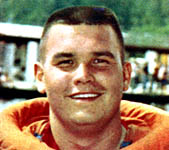 The good-natured young giant from Costa Mesa, California, laughed at himself.
"Man, I finally found a boat I can fit into," the 20-year-old Rex
Bixby said. After a three-year apprenticeship in limiteds, Bixby, a fine
unlimited driving prospect, has a seat in $ Bill. Rex weighs 230 pounds
and is still growing, patches of puppy fat rest on his big body like the rolls
on a professional football player in spring training. Bixby, a Mohawk haircut
and dark eyes, sped to a third-place finish in the first unlimited heat he ever
entered. His start was called "one of the finest of all time" by
racing officials who saw him streak across the starting line, virtually riding
the starting cannon's blast. And a week before . . . . "Yes, I've had accidents," Bixby said.
"Last week was the latest. My limited started `walking' from sponson to
sponson. It's never much of a `walk' before you hit the drink," he said
with a big kid's laugh. The good-natured young giant from Costa Mesa, California, laughed at himself.
"Man, I finally found a boat I can fit into," the 20-year-old Rex
Bixby said. After a three-year apprenticeship in limiteds, Bixby, a fine
unlimited driving prospect, has a seat in $ Bill. Rex weighs 230 pounds
and is still growing, patches of puppy fat rest on his big body like the rolls
on a professional football player in spring training. Bixby, a Mohawk haircut
and dark eyes, sped to a third-place finish in the first unlimited heat he ever
entered. His start was called "one of the finest of all time" by
racing officials who saw him streak across the starting line, virtually riding
the starting cannon's blast. And a week before . . . . "Yes, I've had accidents," Bixby said.
"Last week was the latest. My limited started `walking' from sponson to
sponson. It's never much of a `walk' before you hit the drink," he said
with a big kid's laugh. |
|
"I began racing in Alaska and became Alaska State Champion in 1959," he said. The same year he was offered the jockey position with the Miss Spokane unlimited and he took it. Presently, he drives the Notre Dame. In 1962 on Pyramid Lake in Nevada, Rex had an accident, a bad accident. "The boat flipped over on me and skindivers had to get me out," he said, with a calmness which indicated it was not hard to talk about-now. "I spent 20 days in a Reno hospital. There was pressure on me to quit boat driving. God knows, I had plenty of time to think about it lying there," he said, a graven look of reminiscence opening to a smile as some kids interrupted to ask for autographs. One of the signature seekers was a blue-eyed teenager who obviously wanted a close look at her hero as much as she wanted his ballpointed name. "I don't know why I ever went out again," Rex continued. "Maybe it was to prove something to myself. I was very apprehensive lying in that bed. I think I wanted to know myself just what I would do out on the course. Once I got out there, the fear went away. I knew it would never come to me again," he said. Race authorities say Manchester is driving more competitively today than he ever had before. |
|
"The speeds of today's boats demand quick thinking, and a man can't ask for much more than that," he said, then added with a glimpse of anticipation in his voice, "I have a great deal of action ahead of me in this sport. |
|
"It becomes a way of life," according to Hickling. "After a while you can't remember that there ever was any other." Ask a driver what the critical point in any race is and the answers come back as varied as the techniques. Only the flaming turns the boats have to make are universally mentioned. |
|
"They turn pretty wide in their big boats and turns are always important unless you don't mind running up on shore," he said. "Equally important is making sure you have the correct time to see the race start. Make a false start and it's a disaster no amount of driving can overcome," Byers said. "There's no one point in a race that can be called critical if it means making other things less critical," is the opinion of Chuck Thompson. "The whole race is critical. Make a mistake on a turn or on the straightaway and there is always somebody waiting to gobble you up. You have to have a decent start, but you can't be a lead foot. There's a lot of thought going into each race. Some guys learn all this quickly," Chuck said, "and some guys never learn it at all." "The start and the first turn," said Ron Musson, "are most important. Get those and you often have the race." "Knowledge of the competition in your heat is important," according to Manchester. "You want a good start, but you also have to know who are the `hot dogs' and who are the slow boats in the race with you. The slower boats you can work on later in the race. You want to beat the fast boats at the start," he said. He's not the only Manchester with a problem before the race. "My wife, Evelyn, also has quite a problem," Rex said. Her husband drives the Notre Dame, but her father, Ole Bardahl, owns Miss Bardahl, and sometimes her rooting requires a split personality. "I think you have to win the first turn," said young Bixby. "But if I don't get it, it doesn't mean I'm going to give up on the course. Too much that's unforeseen can happen after the heat begins," he said with a wisdom belying his youth. "Knowledge of your equipment. What it can do. What it can't do. Those are very big hunks of knowledge in any boat race," said veteran Cantrell. And then he spoke of racing in this rapidly changing world. "Racing conditions are in a state of flux and the race this year on Lake Tahoe is symptomatic of all this," he said. "It has many new innovations for the spectators and drivers, innovations I believe will be a hallmark for racing in the future. Things people will see here this year will become the normal course at other race sites in the future . . . and I'm very excited about driving in it here," he said. Then he laughed. This man who has been driving for 41 years and is looking forward with a great deal of excitement to a race which love, vast knowledge and a lifetime of competition has fully qualified him for. Cantrell has spilled in no less than 17 major accidents in his career. He's broken everything from toenails to shoulder blades. He was asked if he is afraid out on the course. And "Wild Bill" just laughed and laughed. |
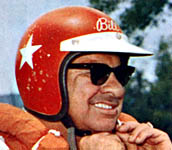 "Why do I drive?" the bluff man with the Wallace Beery face said in
a soft southern accent which made "drive" come out "drahve."
He turned his big hands over within themselves before he answered, the heavy
spatulate fingers folding into a lattice. "The water fascinates me. It
always has. It always will," he said.
"Why do I drive?" the bluff man with the Wallace Beery face said in
a soft southern accent which made "drive" come out "drahve."
He turned his big hands over within themselves before he answered, the heavy
spatulate fingers folding into a lattice. "The water fascinates me. It
always has. It always will," he said.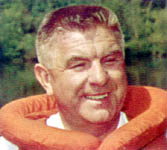 "I drive because I love to drive," said Chuck Thompson, the
throttle pusher behind "Harrah's Tahoe Miss." No one, save
Cantrell, has rifled down more courses trying for more checkered flags than
Thompson has.
"I drive because I love to drive," said Chuck Thompson, the
throttle pusher behind "Harrah's Tahoe Miss." No one, save
Cantrell, has rifled down more courses trying for more checkered flags than
Thompson has.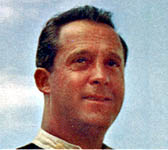 Ron Musson is a study in moods. His rides in Miss Bardahl have
produced some of the most brilliant races of all time. Two years ago, the Bardahl
pilot spilled. He broke nine ribs.
Ron Musson is a study in moods. His rides in Miss Bardahl have
produced some of the most brilliant races of all time. Two years ago, the Bardahl
pilot spilled. He broke nine ribs.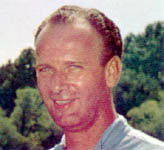 Rex Manchester, a tall, good-looking man with the kind of Grecian curly locks
that have girls chasing Paul Horning, and a profile that should get him into a
TV series, is the perfect composite of the ideal sports figure. He's affable,
soft-spoken, and the darling of the pits, especially among the hero-conscious
younger set. He's also married and the father of six children, dashing feminine
youths' everlasting aspirations. Talk to Rex about driving and the conversation
gets hairy ....
Rex Manchester, a tall, good-looking man with the kind of Grecian curly locks
that have girls chasing Paul Horning, and a profile that should get him into a
TV series, is the perfect composite of the ideal sports figure. He's affable,
soft-spoken, and the darling of the pits, especially among the hero-conscious
younger set. He's also married and the father of six children, dashing feminine
youths' everlasting aspirations. Talk to Rex about driving and the conversation
gets hairy ....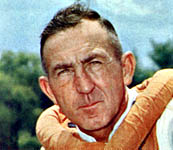 Warner Gardner's another driver who has refused to live his life without
speed. "Colonel," he's called by all who know him and many a stranger,
who, viewing Warner's rugged aquiline visage, prefers to tread lightly until a
proper introduction can be arranged. The sobriquet was come by honestly.
Gardner, or Colonel Gardner, flew 63 combat missions in World War II before
retiring as a Lieutenant Colonel in the Air Force. He has raced boats all his
life, and now guides the fortunes of Mariner Too. The Colonel's comments
are delivered with the precision of his own impeccable military bearing.
Warner Gardner's another driver who has refused to live his life without
speed. "Colonel," he's called by all who know him and many a stranger,
who, viewing Warner's rugged aquiline visage, prefers to tread lightly until a
proper introduction can be arranged. The sobriquet was come by honestly.
Gardner, or Colonel Gardner, flew 63 combat missions in World War II before
retiring as a Lieutenant Colonel in the Air Force. He has raced boats all his
life, and now guides the fortunes of Mariner Too. The Colonel's comments
are delivered with the precision of his own impeccable military bearing.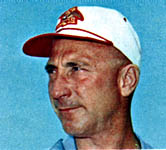 Chuck Hickling, the bald eagle of the racing fraternity, is always on the
course last. It's a predilection of boat-owner Bernie Little that Miss
Budweiser remain suspended high and dry from her crane hoist until the
five-minute gun is sounded. Chuck drives Bud. He's been hustling speed
boats along since 1936, but he didn't hook up with the big craft until 1957.
Chuck's been driving the higher priced spreads ever since.
Chuck Hickling, the bald eagle of the racing fraternity, is always on the
course last. It's a predilection of boat-owner Bernie Little that Miss
Budweiser remain suspended high and dry from her crane hoist until the
five-minute gun is sounded. Chuck drives Bud. He's been hustling speed
boats along since 1936, but he didn't hook up with the big craft until 1957.
Chuck's been driving the higher priced spreads ever since.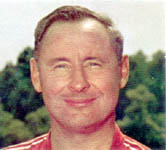 "I try to stay inside Chuck Thompson and Manchester," said Buddy
Byers, the pin-sized extrovert who pilots Miss Madison.
"I try to stay inside Chuck Thompson and Manchester," said Buddy
Byers, the pin-sized extrovert who pilots Miss Madison.